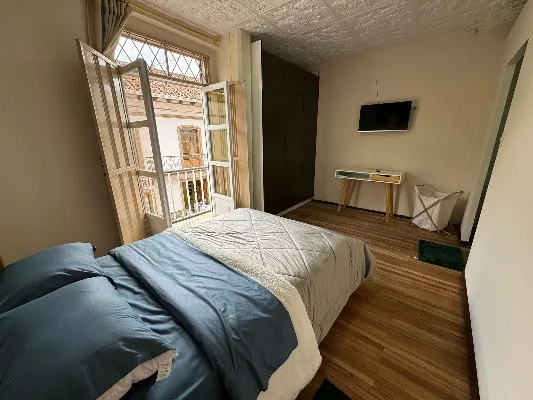The climate crisis is real. What can you do?
Editor’s note: This is the last of an eight-part series about the climate and biodiversity crises. John Keeble is a former Guardian and London Evening News journalist. He is part of Cuenca’s thriving hiking, cycling and writing communities. You can download free his latest novel, Beyond Extinction, via www.johnkeeble.net. To read part one of the series, click here.
By John Keeble
Okay, the world is crashing into twin crises with the climate changing and biodiversity dying off – what can you do about it apart from tacit support for the idea of taking action?
 The BBC’s Chief Environment Correspondent, Justin Rowlatt, tried to put climate campaigner Greta Thunberg on the spot by saying individuals could not make a difference.
The BBC’s Chief Environment Correspondent, Justin Rowlatt, tried to put climate campaigner Greta Thunberg on the spot by saying individuals could not make a difference.
She cut him down to size by saying: “The point is to create an opinion. By stopping flying, you don’t only reduce your carbon footprint but also that sends a signal to other people around you that the climate crisis is a real thing and that helps to push a political movement.”
He didn’t get far with her – except a very nice photo, which I hope the BBC won’t mind me recycling here – so he tried Professor Peter Singer, of Princeton University in the US.

Greta Thonberg and the BBC’s Justin Rowlatt. Credit: BBC
Prof Singer, a specialist on practical ethics, said: “I think [taking action on climate change] is one of the great moral challenges of the 21st Century, perhaps the greatest moral challenge. If we are not acting, we are endangering everyone alive now and also future generations.”
An Australian university professor, Kelly Fielding, a behavioural psychologist, took a more active line of reasoning in an interview with the BBC. She said that it should be possible to get people to support measures to combat climate change and loss of biodiversity if they are given clues about the problem. People make decisions when they see how other people are acting.
My questions: How many clues do you need? There is a worldwide clamour for action to save our planet and the human future. Are you part of it?
Taking practical steps can be difficult. Here are a few immediate ideas – but, really, you are the best person to decide your own way of helping.
Clothes: Stop buying new, especially cheapo “fast fashion” goods designed to wear out quickly; if you need to buy, get something from a resale shop or a friend; keep what you have longer; repair rather than replace; make a virtue of not having the latest fashion – tell all your friends what you are doing, why and how.
Diet: Cut down or stop eating meat, dairy and fish; replace carefully with plant-based food; if you can’t imagine how to do that, go to a flexitarian diet where you are gradually increasing the plant-based elements over six months or a year; look on the internet for idea and recipes; join Cuenca Vegans & Vegetarians on Facebook (it is not just for veg*ns – it welcomes anyone going that way and wanting help). Reducing meat, dairy and fish will help save the planet, save you money, make you feel better because it will mean you will be eating fresh food, and become a sustainable way of life for you. Tell all your friends what you are doing, why and how.
Transport: Cut down. Walk more. Cycle if safe. Use public buses instead of a car. Fly only when you need to. Tell all your friends what you are doing, why and how.
Possessions: Stop buying items you do not need. Everything comes from resources somewhere. Ask yourself if you need it. If you must buy, make sure it comes from sustainable resources. Tell all your friends what you are doing, why and how.
Energy: Use less electricity by changing to low-power lighting, not leaving appliances running, and using heating/cooling in moderation. Tell all your friends what you are doing, why and how.
Waste and recycling: Try to eliminate waste, especially food. Buy small amounts, use, buy more. Recycling is worth doing – but not buying is vastly better. Tell all your friends what you are doing, why and how.
Be politically savvy: Check which candidates pledge to fight climate change and loss of biodiversity, and vote for them. Think of yourself as a proxy voter for your grandchildren and the future generations. Tell all your friends what you are doing, why and how.
Become an opinion leader: Your views and actions can influence others. The wave of support for climate and biodiversity action is growing – you can help it with your advocacy, even if it is just leading by example and sharing posts on Facebook. Tell all your friends what you are doing, why and how.
Become an activist: Find ways to open the eyes of the people in power as well as opening the eyes of individuals. Join organisations. Use social media to spread the message. Say to your grandchildren: “Together, we must save the planet for your future.”
Never give up, never give in: The future depends on you. Governments and corporations will never make urgent and effective changes without being pushed into them.
Finally, because we started this series of articles asking what future generations would say about people of our time, one last idea.
Older people, especially adventurous baby boomers, have the courage and ability to do more than watch the world come apart.
What about a Gran’s Army in support of the climate and biodiversity campaigners like Greta Thunberg? We took a wrong turn and wrecked the world. We should be fighting to save what we can.


















